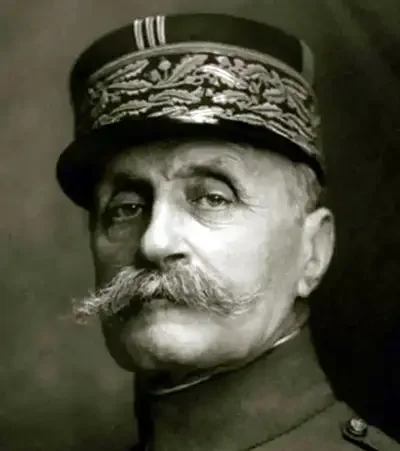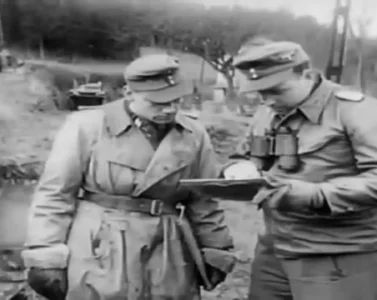- Military History
- Biographies
- Militarians Biographies
- Field Marshal Ferdinand Foch
Field Marshal Ferdinand Foch
Biography of the French General and Commander of the Allied Forces during WW I
Ferdinand Jean Marie Foch, a military theorist, French General and the Commander of the Allied Forces at the end of WW I, was born on October 2, 1851 in Tarbes, Hautes-Pyrenees, France. He attended school in Tarbes and Rodez and college in St. Etienne. Being inspired and influenced from early childhood by the stories of campaigns his maternal grandfather, who had been an officer during the Revolutionary and Napoleonic eras, told him about the Napoleonic Wars, he pursued a military career.
At the outbreak of the Franco-Prussian War in 1870, Foch joined the French 4th Infantry Regiment, which did not take part in combat. After the war ended in 1871, he remained in the army. He entered the Ecole Polytechnique near Paris and became a lieutenant in the 24th Artillery Regiment in Tarbes in 1873. In 1876, he attended the cavalry school of Saumur to train as a mounted artillery officer and became a captain in 1878. In 1879, he was assigned to the Central Personnel Service Depot of the artillery in Paris.
Foch received further military training at the Ecole Supérior de Guerre, to which he returned as an instructor in 1895 and later became a full-time professor of military history, strategy and general tactics at the institution while being recognized as the French theorist on offensive strategies. Gradually he rose in ranks: in 1898 he was promoted to Lieutenant-Colonel, five years later Colonel serving as regimental commander of the 35th Artillery Regiment, in 1907 Général de Brigade assuming command of the French École Militaire. In 1911, he was promoted to Major General. Two years later, he took command of XX Corps at Nancy as Lieutenant General, leading his men into battle when WW I broke out in 1914.
Foch was selected to command the newly formed Ninth Army during the First Battle of the Marne with Maxime Weygand as his Chief of Staff. He led his men in an inspired defense of the St. Gond area during the critical Battle of the Marne (September 6-9, 1914). During the "race to the sea" that followed the Marne, he won the admiration of French General Joseph Joffre, who became his patron. Because of his remarkable performance during the First Battle of Marne, he was promoted to the rank of assistant Commander-in-Chief and was sent north to coordinate movements of the French, British, and Belgian armies, no small task given their differences in language and temperament.
Foch commanded the northern army group between 1915 and 1916. His allies criticized him for his troop allotments during the German gas attack at Ypres, and he made no noticeable gains during the Somme campaign (1916). The lowest point of Foch's career came when Joffre was removed from overall command, but Foch bounced back to prominence when Joffre's replacement was Foch himself. He became Chief of the General Staff and acted as one of the military representatives of the Supreme War Council in 1917.
In early 1918, Germany attempted to further advance. During a collapse in the allied line, French and British leaders agreed to name Foch "generalissimo" of the combined forces. Belgium and the United States followed suit, making Foch the Supreme Allied Commander for the rest of the war. The German attacks faltered in June, and by July, Foch was on the offensive everywhere. He disagreed frequently with US General John Pershing. Foch wanted to establish his dominance in the relationship, but he had to accept the fact that the two million American soldiers, who were essential to the war effort, remained under Pershing's command.
Foch planned and coordinated the tremendous allied offensives that broke the Siegfried Line on the German border and brought the German diplomats to the peace table. Foch himself dictated the terms of the armistice to the Germans in a railway car at Compiegne on November 11, 1918. It was sweet satisfaction for the man who had witnessed his nation's defeat in the Franco-Prussian War 48 years earlier and now achieved his lifelong goal of giving Alsace and Lorraine back to France. Foch was disappointed by the Treaty of Versailles; he believed it was too soft on the Germans.
Foch was awarded with the title British Field Marshal in 1919 and Marshal of Poland (for his advice during the Polish-Bolshevik War 1920) in 1923 and received many other honors from various countries and universities prior to his death.
Ferdinand Foch died on March 20, 1929, at 77, in Paris, France. His remains were laid to rest under the Dome of the Church of Saint Louis in the Les Invalides, next to some of France’s war heroes such as Napoleon Bonaparte.
Field Marshal Ferdinand Foch - Quick Facts
- 35th Parachute Artillery Regiment (France)
- 9th Army (France)
- Army Group North (France)
- French Army
- Moroccan Division (France)
- Franco-Prussian War (1870-1871)
- WWI (1914-1918)
- {{#owner}}
- {{#url}} {{#avatarSrc}}
{{name}} {{/url}} {{^url}} {{#avatar}} {{& avatar}} {{/avatar}} {{name}} {{/url}} - {{/owner}} {{#created}}
- {{created}} {{/created}}
























